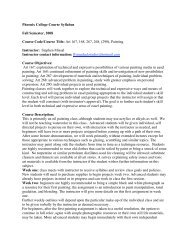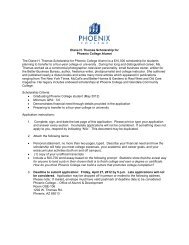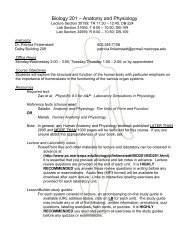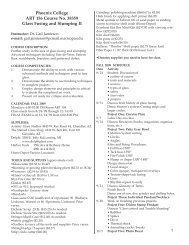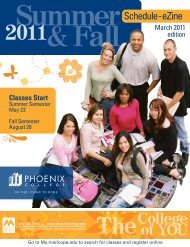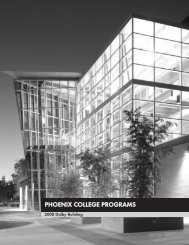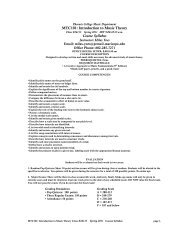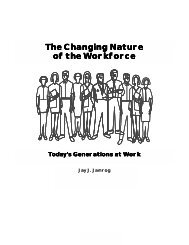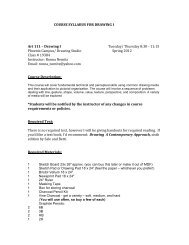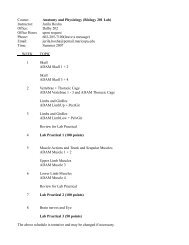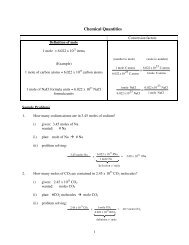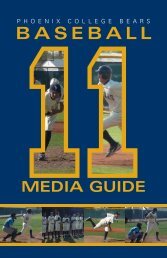Phoenix College Catalog 2009-10
Phoenix College Catalog 2009-10
Phoenix College Catalog 2009-10
You also want an ePaper? Increase the reach of your titles
YUMPU automatically turns print PDFs into web optimized ePapers that Google loves.
62 | <strong>Phoenix</strong> <strong>College</strong> <strong>2009</strong>–20<strong>10</strong> CATALOG<br />
MCCCD Common Policies<br />
penalties for infringement include significant damages--<br />
potentially in excess of $<strong>10</strong>0,000 for each work infringed.<br />
How does copyright law affect information I obtain off the<br />
Internet?<br />
Copyright law covers works in both traditional and new media,<br />
including digital media. Copyrightable materials are often<br />
available on the Internet without any indication of their<br />
copyrighted status. As a rule of thumb, you should assume that<br />
everything you find on the Internet is copyrighted, unless<br />
otherwise . Even popular activities, such as file swapping or<br />
copying software, or pictures from the Internet, may be<br />
copyright infringement and should be avoided.<br />
The Digital Millennium Copyright Act, which Congress enacted<br />
in 2000, affords greater protection for copyright holders of<br />
digital works. Generally, then, even if a work appears solely in a<br />
digital form, it is likely subject to copyright law protections.<br />
New technology has made many creative works widely available<br />
through the Internet. For example, the technology known as<br />
Peer to Peer (P2P) allows for the transmission of music, videos,<br />
movies, software, video games and other materials--most of<br />
which is subject to copyright protection.<br />
Remember that a copyright exists in a work at the time it<br />
becomes fixed in some tangible medium of expression. That<br />
means that an image you have downloaded from the Internet,<br />
as well as a video or musical performance is almost certainly<br />
subject to copyright protection. When you download these<br />
works, transfer them to a disk or other medium, or send them<br />
to a friend, you are infringing on the rights of the copyright<br />
holder. Trafficking in such material without the permission of the<br />
copyright holder, then, violates copyright law. This includes<br />
unauthorized music file sharing over the Internet.<br />
According to a statement recently issued by representatives of<br />
the motion picture, recording and songwriting industries,<br />
uploading and downloading copyrighted works over the Internet<br />
is theft: "It is no different from walking into the campus<br />
bookstore and in a clandestine manner walking out with a<br />
textbook without paying for it."<br />
Why is it important for a student to be aware of copyright<br />
law?<br />
Copyright infringement is expressly prohibited by the U.S.<br />
Copyright Act. Anyone who infringes another's copyright in a<br />
creative work is subject to liability, and could be required to pay<br />
large sums in damages.<br />
In addition, as the law clearly prohibits copyright infringement,<br />
using any college resources--such as photocopiers, desktop and<br />
laptop computers, printers, central computing facilities, localarea<br />
or college-wide networks, Internet access, or electronic<br />
mail--for the purpose of infringing a copyright in any work may<br />
be grounds for student discipline. According to Maricopa<br />
Community <strong>College</strong> District administrative regulation, "students<br />
are expected to comply with the provisions of the Copyright Act<br />
of 1976 pertaining to photocopying of printed materials, copying<br />
of computer software and videotaping."<br />
Moreover, under the Maricopa Community <strong>College</strong>s Computing<br />
Resource Standards, a student is prohibited from the "use of<br />
software, graphics, photographs, or any other tangible form of<br />
expression that would violate or infringe any copyright or similar<br />
legally-recognized protection of intellectual property rights." The<br />
Standards also prohibit "transmitting, storing, or receiving data,<br />
or otherwise using computing resources in a manner that would<br />
constitute a violation of state or federal law . . . ."<br />
A student who violates these policies, then, can be disciplined<br />
at any of the Maricopa Community <strong>College</strong>s. This discipline<br />
could include suspension or even expulsion.<br />
Does copyright law allow me to download files from a college<br />
web site?<br />
Thanks to recent changes to copyright law colleges and<br />
universities are allowed to transmit copyrighted images,<br />
recordings, and other materials over the Internet in connection<br />
with distance learning offerings. These changes allow for the<br />
performance of non-dramatic literary works or musical works,<br />
as well as the display of "reasonable and limited portions" of any<br />
work in an amount comparable to that typically displayed in a<br />
live classroom setting. Use of the works must, however, be "an<br />
integral part" of the distance-learning class session, and available<br />
solely to students enrolled in the class. In addition, the<br />
transmission of the copyrighted works must be under the<br />
direction or actual supervision of an instructor.<br />
Even though the college does not hold the copyright to these<br />
works, or even have the express permission of the copyright<br />
holder, they may be delivered over the Internet to students in<br />
distance learning classes.<br />
The fact that the law authorizes such use of copyrighted<br />
materials, though, does not allow a student in these classes to<br />
freely download, copy, or re-transmit the works. They are<br />
intended solely for use by the institution in connection with<br />
distance instruction; any other use would likely constitute a<br />
violation of copyright law.<br />
To learn more about copyright, go to:<br />
http://www.maricopa.edu/legal/ip/index.htm<br />
While you’re there, you should read the Maricopa Community<br />
<strong>College</strong>s' Copyright Guidelines. You should also review the<br />
complete text of the Computer Resource Standards (www.<br />
maricopa.edu/legal/dp/inbrief/compstandards.htm). The<br />
Standards also appear in college catalogs and student<br />
handbooks.<br />
Taping of Faculty Lectures (AR 3.4)<br />
MCCCD acknowledges that faculty members are, by law, afforded<br />
copyright protection in their classroom lectures and, therefore, may<br />
limit the circumstances under which students may tape (audio/visual)<br />
their classes.<br />
Each faculty member shall inform his/her students within the first<br />
week of classes to his/her policy with regard to taping. Failure to do<br />
so will accord students the right to tape lectures.<br />
Students with disabilities that render them unable to take adequate<br />
lecture notes are entitled to reasonable accommodation to remedy<br />
this inability. Accommodation may require a faculty member to<br />
exempt a student from his/her taping policy.<br />
Technology Resource Standards (AR<br />
4.4)<br />
Introduction<br />
The Maricopa County Community <strong>College</strong>s District (MCCCD)<br />
provides its students and employees access to information resources<br />
and technologies. Maricopa recognizes that the free exchange of<br />
opinions and ideas is essential to academic freedom, and the<br />
advancement of educational, research, service, operational and<br />
management purposes, is furthered by making these resources<br />
accessible to its employees and students.<br />
At Maricopa, technological resources are shared by its users; misuse<br />
of these resources by some users infringes upon the opportunities of<br />
all the rest. As Maricopa is a public institution of higher education,<br />
however, the proper use of those resources is all the more important,<br />
Maricopa requires users to observe Constitutional and other legal



